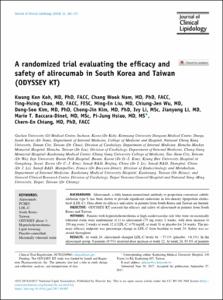KUMEL Repository
1. Journal Papers (연구논문)
1. School of Medicine (의과대학)
Dept. of Internal Medicine (내과학)
A randomized trial evaluating the efficacy and safety of alirocumab in South Korea and Taiwan (ODYSSEY KT)
- Keimyung Author(s)
- Nam, Chang Wook
- Department
- Dept. of Internal Medicine (내과학)
- Journal Title
- Journal of Clinical Lipidology
- Issued Date
- 2018
- Volume
- 12
- Issue
- 1
- Keyword
- Alirocumab; Hypercholesterolemia; LDL-C; Maximally tolerated statin; ODYSSEY phase 3; PCSK9; Placebo-controlled; South Korea; Taiwan; Lipid lowering
- Abstract
- BACKGROUND:
Alirocumab, a fully human monoclonal antibody to proprotein convertase subtilisin/kexin type 9, has been shown to provide significant reductions in low-density lipoprotein cholesterol (LDL-C). Data about its efficacy and safety in patients from South Korea and Taiwan are limited.
OBJECTIVE:
ODYSSEY KT assessed the efficacy and safety of alirocumab in patients from South Korea and Taiwan.
METHODS:
Patients with hypercholesterolemia at high cardiovascular risk who were on maximally tolerated statin were randomized (1:1) to alirocumab (75 mg every 2 weeks, with dose increase to 150 mg every 2 weeks at week 12 if LDL-C ≥70 mg/dL at week 8) or placebo for 24 weeks. The primary efficacy endpoint was percentage change in LDL-C from baseline to week 24. Safety was assessed throughout.
RESULTS:
At week 24, alirocumab changed LDL-C levels by -57.1% (placebo: +6.3%). In the alirocumab group, 9 patients (9.5%) received dose increase at week 12. At week 24, 85.8% of patients in the alirocumab group reached LDL-C <70 mg/dL (placebo: 14.2%; P ≤ .0001 vs placebo). Alirocumab significantly improved non-high-density lipoprotein cholesterol (non-HDL-C), apolipoprotein B, total cholesterol, lipoprotein (a), and HDL-C vs placebo (P ≤ .05). Two consecutive calculated LDL-C values <25 mg/dL were recorded in 27.8% of alirocumab-treated patients. Overall, 58.8% (alirocumab) and 61.8% (placebo) of patients experienced treatment-emergent adverse events; 2.1% and 1.0% discontinued treatment due to treatment-emergent adverse events, respectively.
CONCLUSION:
Alirocumab significantly improved LDL-C, apolipoprotein B, non-HDL-C, lipoprotein (a), HDL-C, and total cholesterol in Asian patients. Alirocumab was generally well tolerated. These findings are consistent with ODYSSEY findings to date.
- Keimyung Author(s)(Kor)
- 남창욱
- Publisher
- School of Medicine (의과대학)
- Citation
- Kwang Kon Koh et al. (2018). A randomized trial evaluating the efficacy and safety of alirocumab in South Korea and Taiwan (ODYSSEY KT). Journal of Clinical Lipidology, 12(1), 162-172.e6. doi: 10.1016/j.jacl.2017.09.007
- Type
- Article
- ISSN
- 1933-2874
- Appears in Collections:
- 1. School of Medicine (의과대학) > Dept. of Internal Medicine (내과학)
- 파일 목록
-
-
Download
 oak-2018-0058.pdf
기타 데이터 / 708.47 kB / Adobe PDF
oak-2018-0058.pdf
기타 데이터 / 708.47 kB / Adobe PDF
-
Items in Repository are protected by copyright, with all rights reserved, unless otherwise indicated.